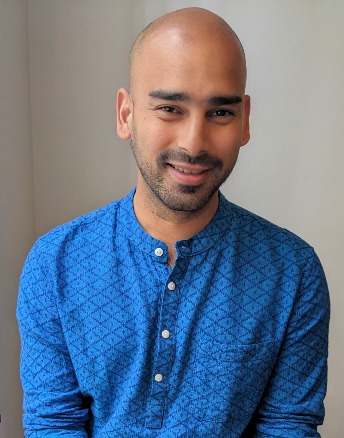Associate Fellows

Christopher Gregory is Reader in Anthropology at the Australian National University. He has been conducting fieldwork on the North Bastar plateau of Chhattisgarh off and on since 1982. He carried out 13 months fieldwork in 1982-83 and has made 14 short trips back since then, the most recent being in April-May 2013. His initial work focussed on the periodic marketing system and the role of kinship and caste in the economic differentiation of merchants, many of whom are immigrants from other parts of India ( Savage Money 1997). His subsequent work has focussed on the Halbi-speaking indigenous people of Bastar. He has published articles on their kinship system and is writing up research on the rice harvest rituals. Lakshmi is the Goddess of Rice in Bastar and women called gurumai sing long oral epics (of around 30,000 lines) about her that are ritually enacted during the harvest season. Contact: chris.gregory anu.edu.au

Frank Heidemann is professor for social and cultural anthropology at the University of Munich since 1997. For his doctoral thesis on Indo-Sri Lankan Labour Migration and the Repatriation of up-country Tamils from Sri Lanka he spent two years in Tamil Nadu conducting research in archives and in villages. After working with these up-rooted landless labourers he focussed his post-doctoral research on the Nilgiri region. His habilitation was on the religious and political system of the Badaga, the farming community in this region. Since 2009 Heidemann is working on the Andaman Islands and conducted a conference on “Manifestations of History” in 2013. His fields of interest include the anthropology of religion, politics, migration, aesthetics as well as history and theory of anthropology. Among his books: Kanganies in Sri Lanka and Malaysia. Tamil Recruiter-cum-Foremen in the nineteenth and twentieth century (Anacon 1992); Akka Bakka – Religion, Politik und duale Souveränität der Badaga in den Nilgiri Süd-Indiens (Münster Lit 2006); Ethnologie. Eine Einführung (Vandehoek & Ruprecht 2011). In 2013 he co-edited The Modern Anthropology of India (Routledge) with Peter Berger. Contact: Frank.Heidemann lmu.de

Aditya Kiran Kakati is a Visiting Scholar, University of Amsterdam (UvA) and an Affiliate Research Fellow, the International Institute for Asian Studies (IIAS) and at The Highland Institute, Kohima, Nagaland. Aditya works as an Associate Editor for The Highlander Journal, which seeks to promote conversations on global highlands to push the boundaries of traditional area studies. His postdoctoral project at UvA and SOAS was titled Blind Spots and Blank Spaces: borderworlds and frontiers at large (1944-1962), which asked how certain places become ‘remote’ despite being part of events with global repercussions like the Second World War (WWII) and decolonization. It examined the relationships between violence, development, infrastructure, and state-making to investigate how ‘remoteness’ is historically produced at the margins of emergent nation-states, which have created shadow zones of armed violence and illicit economies. His PhD dissertation was titled Living on the Edge: How encounters with global war (WWII) re-made the Indo-Burma frontiers into bordered-worlds, which is under revision as a book manuscript.
Aditya's ethnographic project, 'Eating Ethnic Enclaves ', examined the emergence of 'ethnic' cuisine in India due to minority community migrations from the Eastern Himalayan borderlands, a historically conflict-ridden area, has reshaped our understanding of 'tribal' identities in consumer spaces. Aditya's publications continue to engage with the contemporary social history and politics of tribal citizenship, using media such as ethnographic poetry and podcasts to publicly engage with the contemporary politics of India’s borderland and tribal communities. He is currently co-editing a volume to republish a rare book manuscript titled, 'Visnuite Myths and Legends in Folklore Setting' by Banikanta Kakati, using family archives supplemented by scholarly commentaries. This endeavour seeks to make previously unavailable work on Comparative Religion accessible to a broader public audience, contributing to the history and anthropology of religion, and contemporary citizenship debates in India.
Aditya hails from Assam in India. Aditya has previously visited Europaeum-Oxford University (2015), Princeton University (2016-2017), the Institute of Human Sciences (IWM), Vienna (2018) and the Fondation Maison des sciences de l'homme (FMSH), Paris (2023) as a resident scholar. Aditya will teach at the Faculty of Religion, Culture and Society in Groningen from September 2024-March 2025.
Contact email: aditya.kakati iheid.ch

Erik de Maaker (PhD, Leiden University 2006) is an Associate Professor at the Institute for Cultural Anthropology and Development Sociology of Leiden University in the Netherlands. He is working on questions relating to the appreciation and creation of heritage, environment and sustainability, religion and ontology, as well as changing notion of relatedness and belonging. Methodologically, the material, performative and spatial dimensions of social interaction across distinct scales are central to his research. This includes the reinterpretation and reappreciation of ‘traditional’ cultural ideas and practices (‘heritage’) and their growing importance in terms of ethnicity and indigeneity. His current research focuses on people’s relatedness to environment, and how that is embedded in acts of claim making involving humans and nonhumans. Most of his research focuses on highland South and Southeast Asia. Researching the peripheries of post-colonial states has also drawn him to the growing importance of Asia’s borders, and he is one of the founders of the Asian Borderlands Research Network. He is author of the monograph Reworking Culture: Relatedness, Rites, and Resources in Garo Hills, North-East India (OUP, 2022) and co-editor of Environmental Humanities in the New Himalayas: Symbiotic Indigeneity, Commoning, Sustainability (Routledge 2021); Audiovisual and Digital Ethnography: A Practical and Theoretical Guide (Routledge 2021) and Media, Indigeneity and Nation in South Asia (Routledge 2019). He is an author prolifically published in journals such as Asian Ethnography, South Asia, Visual Anthropology and the Journal of Borderland Studies, and he is also an award-winning visual anthropologist. He is a track leader of the Heritage and Identity track of the Leiden-Delft-Erasmus Centre for Global Heritage and Development. For an overview of publications and films see: http://leidenuniv.academia.edu/ErikdeMaaker.
Contact: emaaker gmail.com

Anastasia Piliavsky is a social anthropologist with degrees from Boston University and from Oxford, where she read anthropology as a Rhodes Scholar. She has worked in Rajasthan for more than a decade and has written about politics, crime (and ‘criminal castes’) and secrecy for Modern Asian Studies, Comparative Studies in Society and History, Cambridge Anthropology, and other journals. She is currently Research Fellow at King's College (Cambridge), co-Investigator in a large, collaborative study of democratic cultures and ‘muscular’ politics in India, Pakistan and Bangladesh (funded by the British and European Research Councils) and editor of Patronage as the Politics of South Asia (CUP, 2014). She is also interested in how South Asian deities shape human lives and in questions of hierarchy and caste, as well as the accumulation of anthropological insight into South Asian society. Contact: apiliavsky gmail.com

Harald Tambs-Lyche, professor emeritus, Université de Picardie - Jules Verne, Amiens, studied at Bergen and at SOAS, London, writing his thesis on the Patidar emigrants from Gujarat (London Patidars, Routledge and Kegan Paul 1980). Here, he explores the implications of Barth’s theories of ethnicity for an urban and modern setting. Turning to studies on the history and theory of caste, he worked on Saurashtra, Gujarat. Power, Profit and Poetry (Manohar, Delhi, 1997) traces the changing constellations of caste from the end of the classical period in Saurashtra (ca. 800 C.E.) to the colonial period. The Good Country (Manohar, Delhi, 2004). approaches caste in contemporary society from an interactional point of view. Business Brahmins (Delhi, Manohar, 2011), on the Gauda Saraswat Brahmins of coastal Karnataka, deals with the relations caste identity entertains to ethnicity and class in a situation where all three are salient. His caste studies underline the importance of conflict, competition and power relations, but stress the presence of a hierarchizing mode of interaction and discourse, inspired by Dumont but more particularly by McKim Marriott. He is presently finishing a more systematic presentation of this approach (Demystifying Caste: Elements for a Theory – forthcoming). He has also worked on Hinduism, particularly the Goddess cult (The Feminine Sacred in South Asia (ed.), Manohar, Delhi 1999) and on the Swaminarayana Sect. Other works include a study of Scandinavian missionaries among the Santals, co-authored with Marine Carrin (An Encounter of Peripheries, Manohar, Delhi 2008) and a collection of essays on crisis and identity among India’s peripheral populations (People of the Jangal, co-edited with Marine Carrin, Manohar, Delhi, 2008). He has participated in the recent rush of Gujarat studies, notably as co-editor with Nikita Sud of a special number of the review South Asia, (Religion in the making of a Region, 2011). Contact: tambs live.fr
| Last modified: | 03 December 2024 1.57 p.m. |
